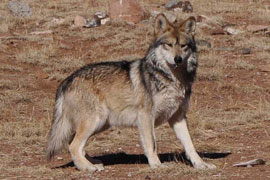Cronkite News has moved to a new home at cronkitenews.azpbs.org. Use this site to search archives from 2011 to May 2015. You can search the new site for current stories.
Conservation group sues feds to speed up Mexican gray wolf reintroduction
PHOENIX – A Tucson-based conservation group sued the federal government Wednesday to speed reintroduction of the Mexican gray wolf in Arizona and New Mexico.
The Center for Biological Diversity contends that officials have failed to respond to the group’s 2004 petition for the U.S. Fish and Wildlife Service to act on recommendations made by panel of scientists engaged by the government.
The group filed its lawsuit, naming Fish and Wildlife as well as the U.S. Interior Department, in U.S. District Court in Washington, D.C.
While the reintroduction program calls for a population of at least 100 in the species’ historic range, there are now an estimated 58 Mexican gray wolves in the forests of eastern Arizona and western New Mexico.
In a news release, the group said the wolf population has grown by just three in the past eight years.
Michael Robinson, a conservation advocate with the center, said lack of population growth can compromise genetic diversity and result in smaller litter sizes and increased mortality among pups.
“The Mexican gray wolf remains on the brink of becoming extinct, and its genetic diversity is declining dangerously,” Robinson said.
Mexican gray wolves, native to Arizona, New Mexico, Texas and Mexico, were hunted to the brink of extinction and gained protection under the Endangered Species Act in the 1970s.
As part of the recovery program, the government began releasing captive-raised Mexican gray wolves were released into the wild in 1998.
The lawsuit says federal officials have failed to respond to the center’s 2004 petition calling for Fish and Wildlife take action on three recommendations that a scientific panel made in a report prepared for the agency in 2001 after a three-year review.
The recommendations in question: allowing wolves to establish territories outside the designated recovery area; providing direct reintroduction of wolves into a secondary recovery zone; and requiring livestock operators to remove livestock carcasses that would attract wolves.
When Fish and Wildlife initially didn’t respond to the petition, the center filed suit in 2007. Robinson said the agency began working on the recommendations, including holding public meetings, but has done nothing since.
“It’s put the wolf population in terrible jeopardy,” he said.
A Fish and Wildlife spokesman in Albuquerque, N.M., said he hadn’t seen the lawsuit and couldn’t comment. An Interior Department spokesman in Washington said in an email that the department doesn’t comment on open litigation.







